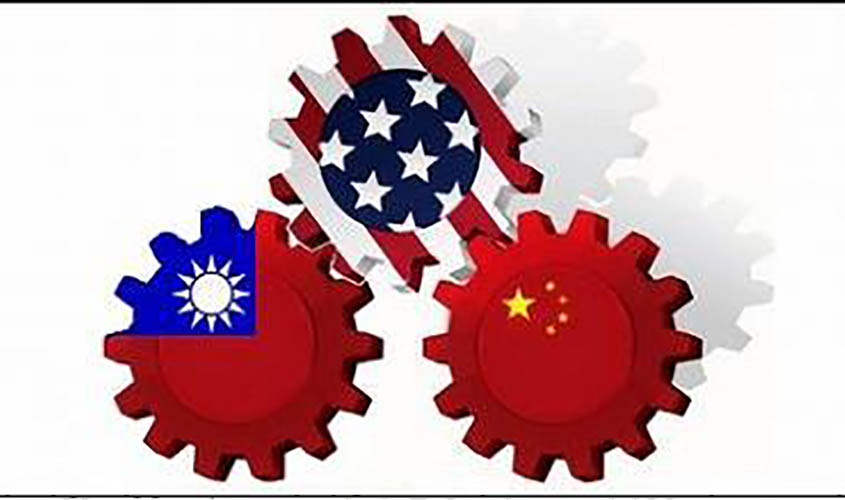Chinese presence in Taiwan is much more pervasive than US influence ever was.
TAIPEI: Unlike the modernity and glitter of the many large cities across the Taiwan Strait, Taipei is almost drab. However, that quality is absent in its people, who are alert and fast-moving, competing in an economy that has almost the same level of foreign trade and reserves as India. Incidentally, after decades of slumber, the business community in Taiwan appears to have awakened to the potential of India as a market. There has been more inward investment from Taiwan in 2018 than in the entire half-century before that year. Quietly and systematically, the Representative of India’s office is reaching out to the Taiwanese, easing visa procedures and encouraging visits. University to university ties have begun to get established, and the Indian (mostly tech) community in this verdant island is expanding almost by the hour. Less than a decade ago, it was difficult to find vegetarian food in Taipei, but these days, Indian restaurants are proliferating, with almost all the clientele local. It helps that the President of Taiwan, Tsai Ing-wen, fell in love with the colours and chaos of India that she experienced on her only visit to our country. A second trip was aborted by the then Foreign Secretary, out of anxiety that Beijing would get riled, which indeed it would have. There is zero love lost between Tsai and the Chinese Communist Party, which correctly sees her and her party (the Democratic Progressive Party or DPP) as an obstacle to President Xi Jinping’s objective of uniting the two sides of the Strait within his term of office. The DPP is about as willing to unite with the PRC as Joshua Wong and other protestors in Hong Kong are ready to abandon the “One Country Two Systems” formula worked out by Deng Xiaoping before his passing in 1997. In contrast, the Kuomintang (KMT) Party talks of an “eventual” unification of the two sides, although these days with far less emphasis than before. It was during the KMT rule of Ma Ying-jeou that communications and people-to-people links across the Strait expanded exponentially, and should the KMT’s Presidential candidate Han Kuo-yu prevail over Tsai Ing-wen in the January 2020 Presidential polls, links between the two sides will accelerate to an irreversible degree. Although reticent in public, Han is a firm backer of unification, and will, if elected, work to ensure that a “de facto unification” takes place through a further multiplication of links between the two sides. More to act as a spoiler that would cause the DPP to lose than with any hope of victory, Taipei Mayor Ko Wen-je seems about to anoint tycoon Terry Guo as his new party’s Presidential candidate. Ko is popular among the youth and several in the DPP who are uneasy at the liberal stance on matters such as same-sex relationships taken by President Tsai, while Guo’s promise to voters is that as a billionaire, he knows best how to create the jobs that young Taiwanese are looking for. With his massive investments across China, Terry Guo as President is unlikely to do anything that would rile the very Chinese Communist Party (CCP) that has allowed him to become a billionaire many times over. Behind the protective cover of language that stresses Taiwanese identity, both Guo and Ko favour closer and closer ties between Taiwan and the superpower to its west, and Beijing knows that it can rely on them to continue the Ma Ying-jeou policy of steadily expanding the links between the two sides of the Strait.
In the 2012 Taiwanese presidential election, Washington was wary of Tsai Ing-wen and joined hands with Beijing (albeit not overtly) to give tacit backing to President Ma Ying-jeou, who won a second term. In the 2020 elections, there is zero doubt about whom the Trump administration favours. It is President Tsai, and the reason for that is not just her liberal outlook and values but the fact that during
The first month of the next year will witness an election that will determine the trajectory of Taiwan for at least a generation. Small wonder that the very capable folks around President Xi are working 24/7 to ensure that Tsai Ing-wen becomes a “One Term President”. The stakes are too high for them to do otherwise. The Chinese presence in Taiwan is much more pervasive than US influence ever was, and this immensely powerful lobby is steaming ahead at speed to try and ensure that the KMT and Taipei Mayor Ko (who are ostensibly rivals, but in fact have been working together to defeat Tsai) succeed in ensuring the DPP’s defeat in both the Presidential polls as well as in the elections to the Legislature, which at present is controlled by the DPP. At the very least, they seek to ensure that the Legislature be controlled by the KMT either by itself or in alliance with Ko’s new party, so as to slow down if not fully block Tsai Ing-wen’s silent but systematic moves towards fashioning a 21st century Indo-Pacific security alliance with the US.

